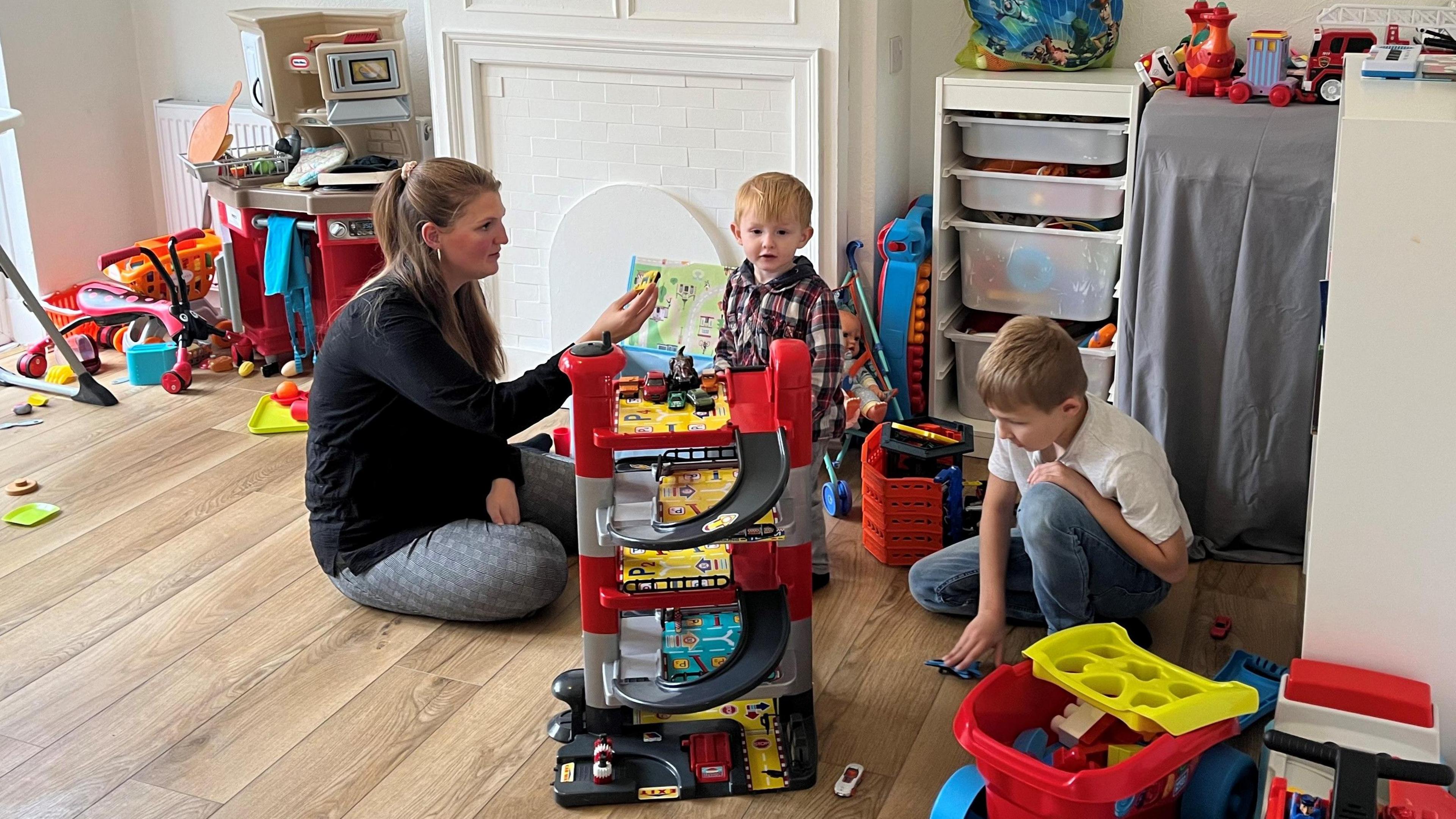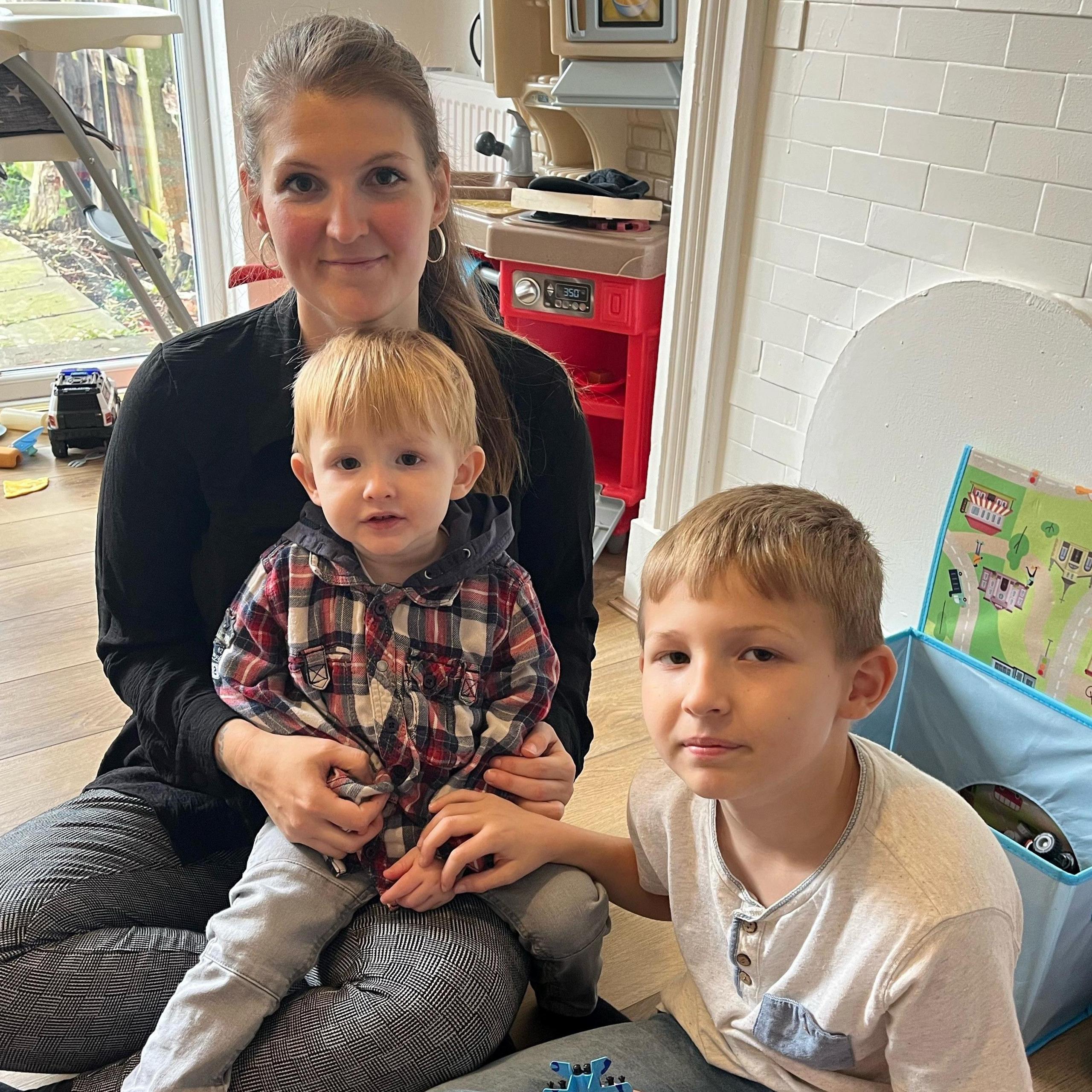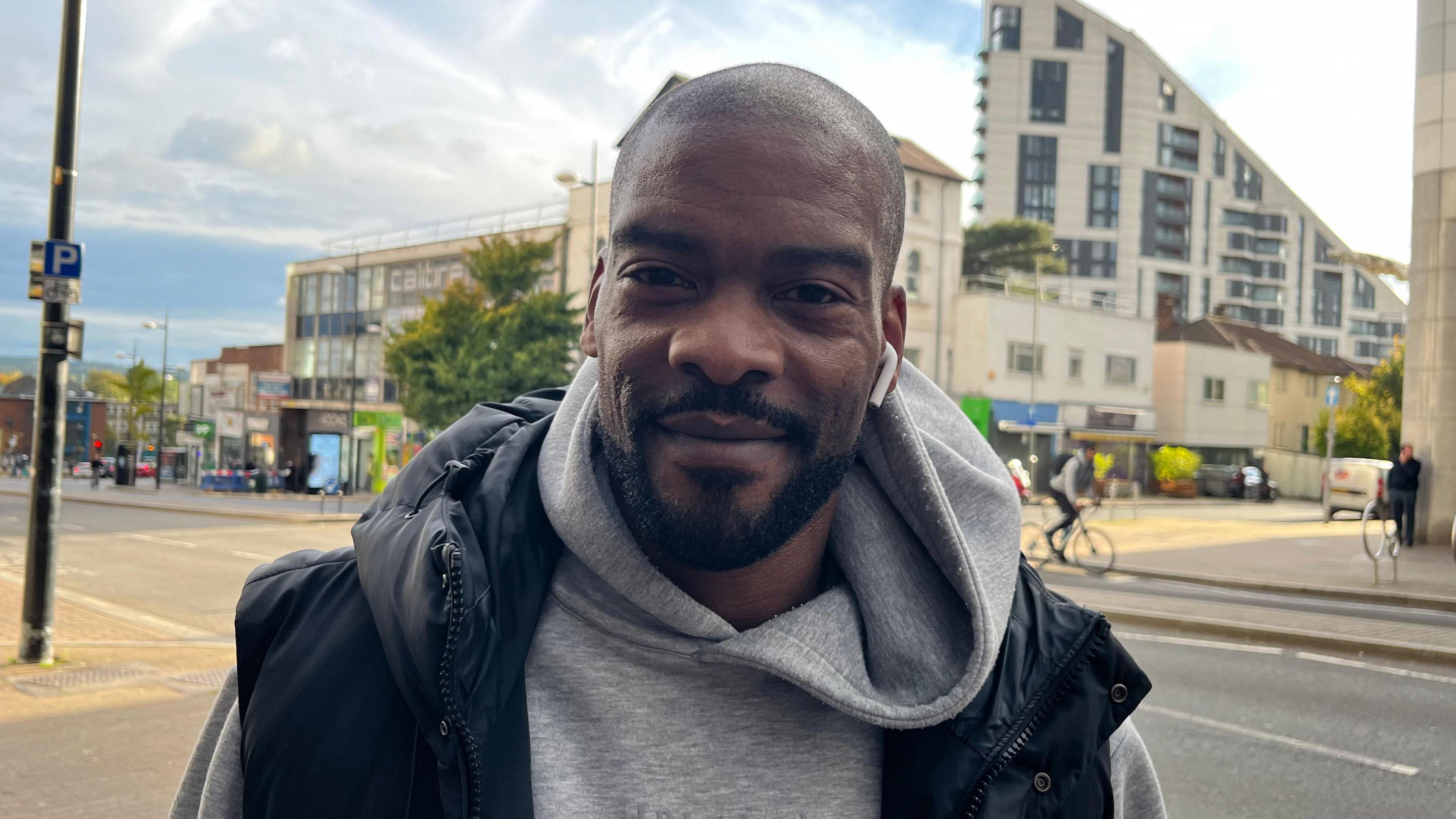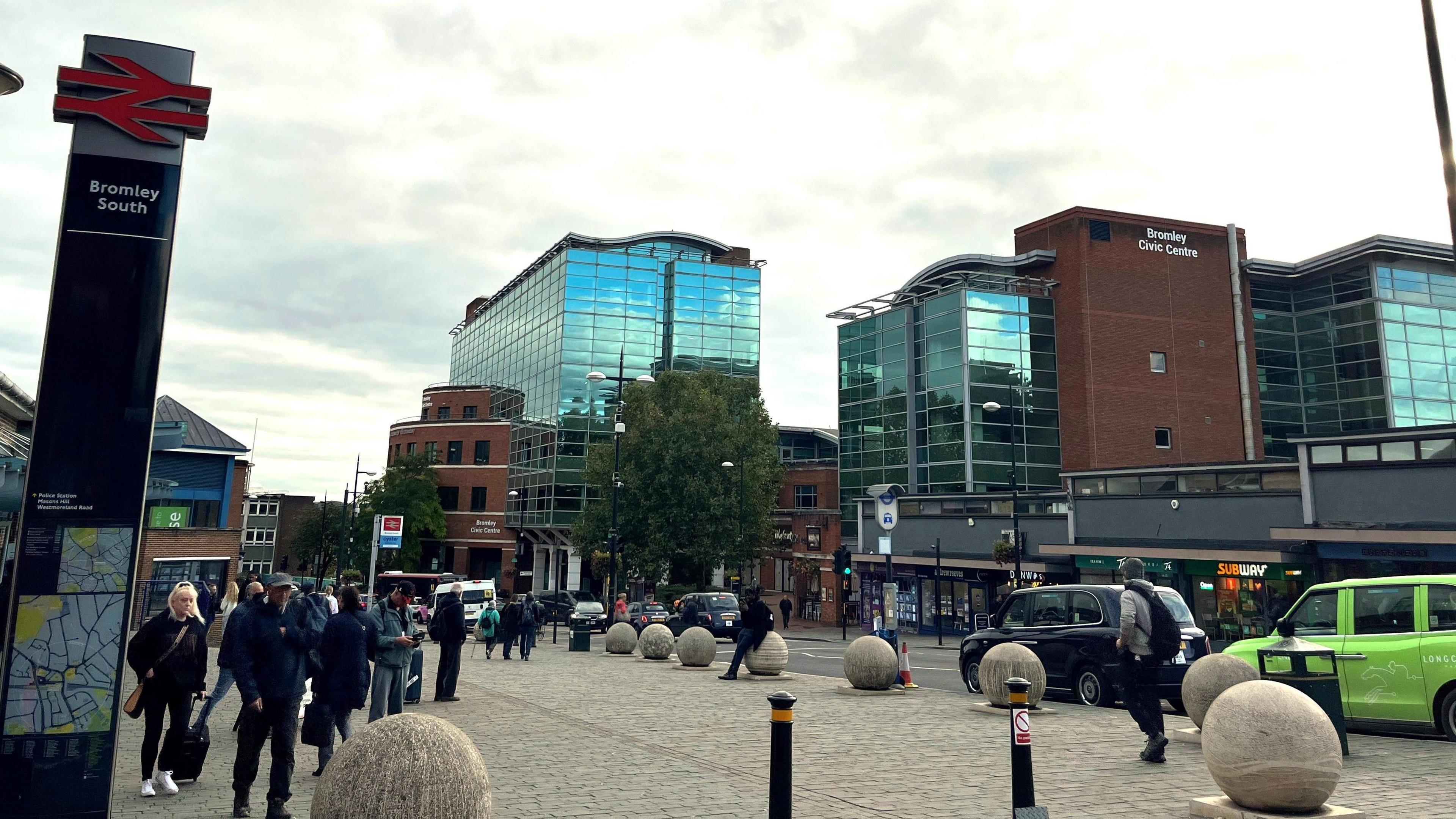Councils in London at financial 'breaking point'

Harlie and her sons are among 175,000 Londoners in temporary accommodation
- Published
Harlie is still unpacking after moving into her third home in three weeks. She has no idea how long she and her two young sons will be able to stay in their latest temporary home in south London.
The repeated moves are "taking a toll on our mental health”, she said. “We’re anxious of where we’re going to be moved to next.”
They are among the rising number of homeless people London’s councils are struggling to house, at a time when some boroughs are warning they could be “on the cusp of financial collapse” without more government funding.
The government said it would move towards a different funding model for councils.

Harlie and her sons, aged two and eight, are in their third temporary home in three weeks
Collectively, London’s 33 local authorities - which deliver everything from street cleaning, libraries and parks, to statutory duties like bin collections, housing the homeless and caring for vulnerable adults and children - are expected to overspend by more than £600m this financial year alone, according to London Councils, a group representing local authorities in the capital. The funding gap is likely to be over £700m next year.
For Harlie, moving between temporary accommodation for the past decade has been difficult. She became homeless because she could not afford the high cost of private rent. She is now caring alone for her two children who are eight and two.
She said: “If we were more settled as a family and had somewhere more secure and safe to live I would be able to get them into nurseries, back into full-time school and sort of be living a normal life because right now the constant moving and upheaval of it all isn’t healthy for anybody.”
Some of the temporary places they have been housed in have had problems with mould and sewage. Explaining why he preferred their latest placement in Lambeth, Frankie said: “I can have baths without raw sewage coming up. I wish we could stay here. I wish it was our house forever.”

In 2020 Croydon became the first London borough to effectively go bust in 20 years
It is unlikely to be their permanent home, though. The family is being housed by Croydon Council - a borough that, four years ago, became the first in London to effectively go bust in two decades. This year it needs to save £30m with another £22m of savings to find next year.
A spokesperson for Croydon Council said it was unable to find the family a permanent home “due to the severe shortage of affordable accommodation in London”.
More stories like this
Outlook for London boroughs' finances 'is bleak'
- Published12 September 2024
London councils spend £90m monthly on homelessness
- Published28 February 2024
Why do councils go bust and what happens when they do?
- Published5 March 2024
Councils have a statutory duty to house the capital's homeless, which is estimated to exceed 175,000 people, who are living in temporary accommodation, external. London Councils has estimated a £250m overspend this year on that issue alone. The other huge cost to councils is social care for adults and children. London’s councils are expecting to overspend on that by £295m this year.
That means they need to find ways to cut costs or generate money elsewhere to try to balance the books.
Lambeth’s Labour leader, Claire Holland, who also chairs the London Councils group, said boroughs were at “breaking point”.
She explained: “We have seen an unprecedented rise in demand; we have a housing crisis, a public health crisis, a social care crisis, driven by 14 years of austerity and then, coupled with that, we’ve seen skyrocketing costs for the delivery of services.
"So all that together means that we have the most dire situation for local government finances that I think we’ve ever faced."

Lambeth is now running its own leisure facilities like Brixton Recreation Centre
Ms Holland said her borough had cut back on street cleaning to save money and brought leisure services back in-house to generate income. So far the move has helped Lambeth to generate about £2m. That is a drop in the ocean, though, for a borough that has to make savings of £70m over the next four years.
Other boroughs like Barnet have started delivering services such as road repairs and children's homes themselves, rather than outsourcing them to private providers to, Barnet Council said, secure “the best value for money”.
Enfield Council, which has predicted a shortfall of £30m next year, is considering closing eight of its libraries, but a council spokesperson said “no decisions” had yet been made on this.
Newham, which has predicted a budget gap of £175m over the next three years, has to find immediate cuts or savings of more than £20m this year. One thing it has decided to do is to cancel the Christmas lights. It said it was more important to keep services like warm spaces for vulnerable residents.

Bromley resident Jamaine wants to see more funding for local services
In Bromley, which has predicted a £93.5m budget gap over the next two years, the council has warned it may have to make cuts to all areas of spending.
Near Bromley South station, residents told me they wanted to see more funding from central government to help their local council.
One man I met, Jamaine, said: “There’s not a lot of good services around in most towns these days, not like how it used to be.”
Lizzie, who works at a local estate agent, said: “We’re selling properties in this area and they need to provide the services so people can enjoy living here.”

Bromley Council said it might have to make cuts to all areas of spending
The Conservative leader of Bromley Council, Colin Smith, told me the problems in local government finances went back further than austerity.
He explained: “The whole of the local government family is now on the very cusp of collapse… because outer London is funded far more unfairly than inner London; it’s the outer London boroughs that are falling over the cliff first. Some have gone already. Some we know are about to go. Even good old Bromley is on that conveyor belt. We think we have about three more years left in us before finance becomes unsustainable.”
One outer borough that has already warned it could soon be falling off that conveyor belt is Havering. Its leader Ray Morgon, who represents the residents' association group that runs Havering Council, said his borough was “on the precipice” and could have to issue a Section 114 notice unless the government gives it more funding. A Section 114 means a council cannot balance its books - it effectively goes bankrupt - and is then limited to all but essential spending.
A spokesperson for the Ministry of Housing, Communities and Local Government said the government would “provide long-term stability by moving towards multi-year funding settlements and ending competitive bidding processes, so we can reform local government and get it back on its feet".
"We will continue to work closely with the mayor and London’s boroughs and speak to them about the difficulties they’re facing.”